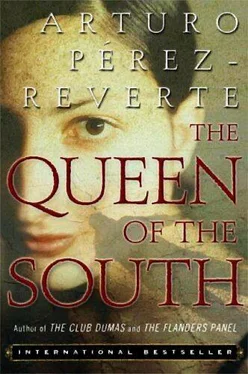Arturo Perez-Reverte - Queen of the South
Здесь есть возможность читать онлайн «Arturo Perez-Reverte - Queen of the South» весь текст электронной книги совершенно бесплатно (целиком полную версию без сокращений). В некоторых случаях можно слушать аудио, скачать через торрент в формате fb2 и присутствует краткое содержание. Жанр: Триллер, на английском языке. Описание произведения, (предисловие) а так же отзывы посетителей доступны на портале библиотеки ЛибКат.
- Название:Queen of the South
- Автор:
- Жанр:
- Год:неизвестен
- ISBN:нет данных
- Рейтинг книги:5 / 5. Голосов: 1
-
Избранное:Добавить в избранное
- Отзывы:
-
Ваша оценка:
- 100
- 1
- 2
- 3
- 4
- 5
Queen of the South: краткое содержание, описание и аннотация
Предлагаем к чтению аннотацию, описание, краткое содержание или предисловие (зависит от того, что написал сам автор книги «Queen of the South»). Если вы не нашли необходимую информацию о книге — напишите в комментариях, мы постараемся отыскать её.
Queen of the South — читать онлайн бесплатно полную книгу (весь текст) целиком
Ниже представлен текст книги, разбитый по страницам. Система сохранения места последней прочитанной страницы, позволяет с удобством читать онлайн бесплатно книгу «Queen of the South», без необходимости каждый раз заново искать на чём Вы остановились. Поставьте закладку, и сможете в любой момент перейти на страницу, на которой закончили чтение.
Интервал:
Закладка:
"No," she said. "Guero was not a good man. He was un hijo de su pinche madre"
3- When the years have passed…
She was nobody," said Manolo Cespedes. "Explain that to me." "I just did." My interlocutor pointed at me with two ringers, between which he held a cigarette. "Nobody means nobody. The lowest of the low. When she got here she had nothing but the clothes on her back, like she was trying to crawl into a hole and disappear… It was just chance." "And something else, too. She was a smart girl."
"So what?… I know a lot of smart girls that have wound up on a street corner."
He looked up and down the street, as though trying to see whether there might be an example he could show me. We were sitting under the awning on the terrace of the Cafe California, in Melilla, the Spanish town that sits across the strait from its country on the Moroccan coast. A noonday African sun turned the modernist facades of Avenida Juan Carlos I yellow. It was the
hour when everyone in Melilla stopped for aperitivos, and the sidewalks and terraces were filled with pedestrians, idlers, lottery vendors, and shoeshine boys. European dress mixed with North African jihabs and djellabas, accentuating the cultural-frontier atmosphere of this place spanning two continents and several races. In the background, around the Plaza de Espafia and the monument to those killed in the colonial war in 1921-a young soldier in bronze with his face turned toward Morocco-the high fronds of the palm trees indicated the nearness of the Mediterranean.
"I didn't know her back then," Cespedes went on. "Actually, I don't even remember her. A face behind the bar at the Yamila, maybe. Or not even that. It was only much later, when I began hearing things here and there, that I finally associated that girl with the other Teresa Mendoza… Like I said. Back then she was nobody."
Former police chief, former head of security at Moncloa, the seat of the Spanish presidency, former parliamentary delegate from Melilla-fate and life had made Manolo Cespedes all those things, although they might have made him a wise, seasoned bullfighter, a happy-go-lucky Gypsy, a Berber pirate, or an astute Rifeno diplomat. He was an old man as dark, lean, and canny as a hophead Legionnaire, with a lot of experience and a lot of under-the-table dealings. We had met twenty years earlier, during that period of violent incidents between the European and Muslim communities that had put Melilla on the front pages of newspapers across the continent, back when I was still earning a living as a reporter. And back then, Cespedes, a Melillan by birth and the highest civilian authority in the North African enclave, knew everyone. He would stop in for drinks at the bar frequented by officers from the Spanish army brigade stationed there, the Tercio; he controlled an efficient network of informers on both sides of the border; he would have dinner with the governor of Nador; and on his payroll he had everyone from street beggars to members of the Moroccan Gendarmerie Royale. Our friendship dated back to that: long conversations, lamb with Middle Eastern spices, gin and tonics until the wee hours of the morning. Between us there was always an unspoken agreement: You scratch my back, I'll scratch yours. Now, retired from his official post, Cespedes was bored and peaceful, growing old, devoted to local politics, his wife, his children, and the noon aperitivos. My visit was a welcome interruption of his daily routine.
"I tell you, it was pure chance," he insisted. "And in her case, the chance was named Santiago Fisterra."
My glass froze in its upward track; I caught my breath. "Santiago Lopez Fisterra?"
"Sure." Cespedes took a drag on his cigarette, gauging my interest. "El Gallego"-the Galician.
I exhaled slowly, took a sip of my drink, and leaned back in my chair, delighted to have picked up a lost trail, while Cespedes smiled, assessing the new balance of our back-scratching account. That name had brought me to Melilla, in search of a period of obscurity in Teresa Mendoza's biography. Until that day on the terrace of the California, I had had only conjectures, or reports that were doubtful at best: This might have happened; they say that such-and-such went on; somebody had been told, or someone thought he remembered… Rumors. The rest-the concrete facts-were few; in the immigration files of the Ministry of the Interior there was only an entrance date-Iberia airlines, Barajas Airport, Madrid-with her real name: Teresa Mendoza Chavez.
Then the official trail went cold for two years, until police report 8653690FA/42, containing fingerprints and one mugshot from the front, one in profile, had allowed me to follow her footsteps with a little more certainty from then on. The report was an old one, kept in an actual manila file folder, before the Spanish police computerized their documents. I'd had it before me on a desk a week earlier, in the police headquarters in Algeciras, thanks to a call from another old friend of mine: the police chief of Torremolinos, Pepe Cabrera. Among the bare facts on the report were two names: a person's and a city's. The person was Santiago Lopez Fisterra. The city was Melilla.
That afternoon Cespedes and I paid two visits. One was brief, sad, and almost useless, although it served to add another name to my list and a face to one of the characters of this story. Across the street from the yacht club, at the foot of the old city's medieval wall, Cespedes pointed out a filthy man with thin, ashy-colored hair who was "watching" parked cars-making sure nothing happened to them, you understand-in exchange for a few coins from the cars' charitable drivers. He was sitting on the ground near a mooring post, staring at the dirty water under the pier. From a distance I took him for an older man, battered by time and life, but as we approached I realized that he was probably not yet forty. He was wearing a pair of old pants torn and crudely sewn back together, an astoundingly clean white T-shirt, and filthy, stinking tennis shoes. The bright sunlight did nothing to hide the matte gray tone of his skin, which was covered with blotches. His face was cavernous; there were hollows at his temples. Half his teeth were missing, and it occurred to me that he resembled the sea wrack thrown up at high tide or by storms.
"His name is Veiga," Cespedes told me as we approached him. "And he knew Teresa Mendoza."
Without pausing to observe my reaction, he said, "Hola, Veiga, how are you," and gave him a cigarette and a light. There were no introductions, no other words between them, and we stood there awhile, silent, looking at the water, the fishing boats tied up, the old mineral barge on the other side of the harbor, and the horrific twin towers built to commemorate the five-hundredth anniversary of the Spanish conquest of the city. I saw scabs, scars, marks on the man's arms and legs. He'd gotten to his feet to light the cigarette-clumsily, muttering disconnected words of thanks. He smelled like stale wine and stale misery. He limped when he walked.
"Ask him, if you want to," Cespedes finally said.
I hesitated and then spoke the name Teresa Mendoza. I detected no sign of recognition, or of memory. Nor did I have any better luck when I mentioned Santiago Fisterra. This Veiga, or what remained of him, had turned back toward the oily water of the pier.
"Try to remember, man," Cespedes urged him. "This friend of mine has come to talk to you. Don't tell him you don't remember Teresa and your partner. Don't make me look bad, all right?…"
But Veiga still didn't answer, and when Cespedes insisted, the most he got was a puzzled, indifferent look as the man scratched lazily at his arms. And those blurred, distant eyes, their pupils so dilated they occupied the entire iris, seemed to slide across people and things from a place there was no returning from.
Читать дальшеИнтервал:
Закладка:
Похожие книги на «Queen of the South»
Представляем Вашему вниманию похожие книги на «Queen of the South» списком для выбора. Мы отобрали схожую по названию и смыслу литературу в надежде предоставить читателям больше вариантов отыскать новые, интересные, ещё непрочитанные произведения.
Обсуждение, отзывы о книге «Queen of the South» и просто собственные мнения читателей. Оставьте ваши комментарии, напишите, что Вы думаете о произведении, его смысле или главных героях. Укажите что конкретно понравилось, а что нет, и почему Вы так считаете.












